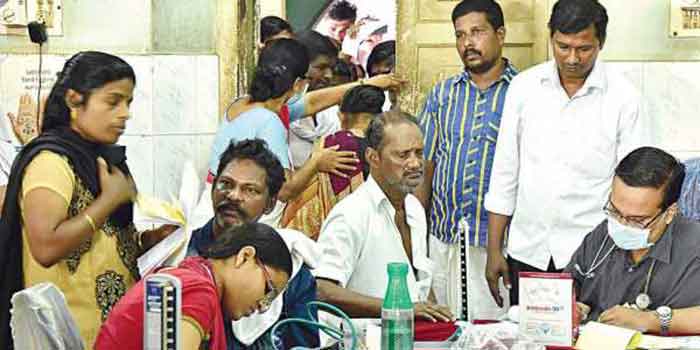Co-Written by Dr. Krati Shrivastava, Dr. Parul Malik & Dr. Arathi P Rao

Globalization with its worldwide economic, political and cultural integration has made the world a small village with the borders being dissolved between countries. It has had a positive aspect and has successfully brought the world closer, but simultaneously, it has also resulted in various important public health issues which could negatively impact the economy of nations, especially that of the developing countries (Hamdi, 2013).
Globalization has, no doubt, had a profound effect on health services and individuals. It has contributed to the development of health and education systems of developing countries (Kelley 2005). These systems are important priorities for any nation to develop and have a strong links with the economic growth. It can clearly be ascertained that in recent years, education has improved as globalization had been a catalyst for job requirements that require higher skills and knowledge. Globalization has had beneficial influence on the health of the people which cannot be negated. Global travel, for instance, and the digital revolution have made it possible for quick response to epidemics and catastrophes that in turn save thousands of lives.
With the globalization process having the said positive impact and more, there has also been either a creation or the worsening of existing disparities in developing nations and addressing those, is probably the need of the hour. Also, the ability of rapid transit between countries has also made it easier for the travellers to carry and thereby cause rapid spread of infectious diseases. Along with this increased travel, there has been a rapid increase in trade due to which there has been a sharp rise in the incidence of diseases such as HIV / AIDS, swine flu, bird flu and many plant-based diseases. Tobacco and alcohol consumption, and the rising silent international epidemic of non-communicable diseases are some other significant examples of the ill effects of the process of globalization. The developed world had faced the brunt of non-communicable diseases (NCDs) as a burden, since a long time. But recent alarming data shows a reverse trend even in the developing world with a dramatic increase in non-communicable diseases, particularly in highly populated transition countries. The epidemic has risen in conjunction with the worldwide rise in non-communicable diseases, driven by rapid urbanization, dietary change and increase in sedentary lifestyles (Joshi, 2015). It is important to look at these health risks and involve the community with the help of continuous monitoring and evaluation along with robust planning to overcome such situations.
India is a developing nation, with more than a billion people, multiple experiences, broad economic and social diversity in terms of class, culture and faith as well as a multitude of governance patterns is a case in point for the impact of globalization on developing nations. It has made significant progress in health achievements by trying to build a robust health infrastructure, increasing the health workforce and allocating resources for primary, secondary, tertiary care in state, voluntary, and private sectors (Arora & Gumber, 2005). But, with the borders shrinking due to rapid globalization, there has been a sharp increase in the incidence of communicable as well as non-communicable diseases. Changes in lifestyle, rapid urbanization and globalization, genetic predisposition and other factors have led to an increase in non-communicable diseases (NCDs) in India (Wagner & Brath 2012). According to new data released by the World Health Organization, approximately 61% of deaths in India are now due to NCDs like heart disease, cancer and diabetes.
Non- communicable diseases pose a significant threat to human health, security and economic growth. Also, in situations like these, the health needs of the local communities must be met along with the assessment of their health risks but, in the wake of globalisation, these communities have often been neglected, and the focus is usually concentrated on the urban populace of India. This has led to the creation of disparities and divides and resulted in a strain on resources with the local people being forced to seek healthcare outside their communities. Thus, they are vulnerable to communicable and non- communicable disease in two ways, either they themselves are the carriers of the disease or when they venture outside become susceptible to new diseases.
When borders dissolve, the free movement of people and goods is growing, creating new problems for global health (Pang & Guindon, 2004). The effects can be either directly at the level of entire populations, people and healthcare delivery systems, or indirectly through the environment and other factors such as education, sanitation and water supply (Woodward et al, 2001) and the impact is manifold in developing or populous nations of the world. Globalization’s ties with health are complex, and it is a multi-faceted phenomenon that can affect health in myriad ways. On one end, these issues cannot be addressed by national governments alone and international organizations and treaties should need to come along to deal with them, whereas on the other end of the spectrum, it is important to have a good health care programmes and initiatives that consider the local needs and beliefs. This could ensure the creation of a better disease fighting mechanism and a healthy workforce and economic prosperity, especially for the developing nations across the globe.
References
Arora, G. K., & Gumber, A. (2005). Globalisation and healthcare financing in India: some emerging issues. Public Finance & Management, 5.
Hamdi, F. M. (2013). The impact of globalization in the developing countries. Developing Country Studies, 3, 142-144.
Hu, F. B. (2011). Globalization of diabetes: the role of diet, lifestyle, and genes. Diabetes care, 34,1249-1257.
Joshi, S. R. (2015). Diabetes care in India. Annals of Global health, 81(6), 830-838.
Kelley, R. (2005). Globalization and health: great possibilities; great concepts. ORTHOPEDICS TODAY, 25, 42.
Pang, T., & Guindon, G. E. (2004). Globalization and risks to health. EMBO reports, 5, S11-S16.
Wagner, K. H., & Brath, H.(2012). A global view on the development of non-communicable diseases. Preventive medicine, 54, S38-S41.
Dr Krati Shrivastava is a dental surgeon and currently a postgraduate student, pursuing Master of Public Health (Global Health) at Prasanna School of Public Health, Manipal Academy of Higher Education (MAHE), Manipal, India.
Dr. Parul Malik is a medical doctor with a Master of Public Health (Global Health) degree from Prasanna School of Public Health, Manipal Academy of Higher Education (MAHE), Manipal, India.
Dr. Arathi P Rao is the Coordinator of MPH Programme and the Head of Manipal Health Literacy Unit at the Prasanna School of Public Health, Manipal Academy of Higher Education (MAHE), Manipal, India.
SIGN UP FOR COUNTERCURRENTS DAILY NEWSLETTER















































